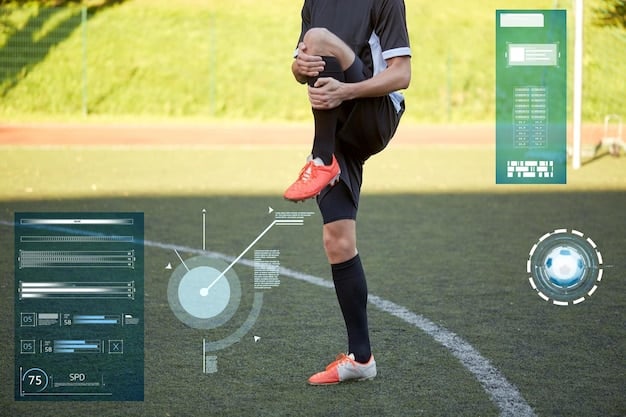Ethical Use of Biometric Data in US Soccer: A Comprehensive Guide

What are the Ethical Considerations of Using Biometric Data in US Soccer? They encompass player privacy, data security, fair access, and potential biases. Balancing performance enhancement with ethical responsibilities is crucial.
The integration of technology in sports is rapidly evolving, and US soccer is no exception. Biometric data, which includes measurements of physiological and behavioral characteristics, is increasingly used to enhance player performance, prevent injuries, and inform training strategies. However, the collection, storage, and use of such sensitive information raise significant ethical questions. What are the Ethical Considerations of Using Biometric Data in US Soccer? This article delves into the complexities of these issues, providing a comprehensive overview for players, coaches, and stakeholders.
We will explore the potential benefits and pitfalls of using biometric data, focusing on the importance of protecting player privacy, ensuring data security, and promoting fairness and transparency. Join us as we navigate the evolving landscape of soccer tech and its ethical implications.
Understanding Biometric Data in Soccer
Biometric data in soccer refers to the collection and analysis of physiological and behavioral metrics from players. This data can include heart rate, sleep patterns, movement analysis, and even cognitive functions. Understanding how this data is used is the first step in addressing the ethical considerations.
Types of Biometric Data Collected
Various types of biometric data are collected from soccer players, each providing different insights into their performance and well-being. These include:
- Heart Rate Variability (HRV): Measures the variation in time between heartbeats, indicating stress levels and recovery.
- GPS Tracking: Monitors player movement, distance covered, and speed during training and matches.
- Sleep Analysis: Tracks sleep duration, quality, and sleep stages to optimize recovery.
- Impact Monitoring: Measures the force and frequency of head impacts to prevent concussions.
This data can be used to tailor training programs, manage workload, and identify potential health risks.
The use of biometric data can significantly enhance player development and performance management. Coaches can use this information to create personalized training plans, optimizing each player’s physical and mental readiness. However, it’s crucial to ensure that this data is used ethically and responsibly.

What are the Ethical Considerations of Using Biometric Data in US Soccer?
What are the Ethical Considerations of Using Biometric Data in US Soccer? The ethical considerations are multifaceted, ranging from player privacy to data security and the potential for discriminatory practices. Addressing these concerns is essential to maintain the integrity of the sport.
Privacy and Consent
One of the primary ethical considerations is player privacy. Players must be informed about what data is being collected, how it will be used, and who will have access to it. Informed consent is crucial, ensuring that players understand and agree to the data collection process.
- Transparency: Clearly communicate data collection practices to players.
- Informed Consent: Obtain explicit consent from players before collecting their data.
- Data Minimization: Collect only the data that is necessary for the intended purpose.
Ensuring that players have control over their data is paramount, fostering trust and promoting ethical data practices.
Moreover, players should have the right to withdraw their consent at any time, and their data should be securely stored and protected from unauthorized access. Failure to address these privacy concerns can lead to legal and reputational consequences, as well as erode trust between players and coaching staff.
Data Security and Storage
Data security is another critical aspect of ethical biometric data usage. Securing the data from breaches, ensuring encrypted storage, and limited access are all important considerations when dealing with the use of biometric data.
Protecting Player Data from Breaches
With enhanced collection of sensitive data comes a bigger responsibility of keeping the data secure and protected, following the guidelines on data security and storage is important.
- Encryption: Encrypt data both in transit and at rest to prevent unauthorized access.
- Access Controls: Limit access to data to authorized personnel only.
- Regular Audits: Conduct regular security audits to identify and address vulnerabilities.
Implementing robust security measures is essential to protect player data from breaches and misuse. Data breaches can have severe consequences, including identity theft, financial loss, and reputational damage. It is the responsibility of organizations to invest in cybersecurity measures to safeguard player data.
Regular security audits and penetration testing can help identify and address potential vulnerabilities. Moreover, organizations should have incident response plans in place to effectively manage and mitigate the impact of any data breaches that may occur.

Ensuring Fairness and Avoiding Bias
Ensuring fairness of the data collected and avoiding any bias that may be present within the collection or interpretation of the data. Considerations need to be made to avoid this.
Algorithmic Bias
Algorithmic bias refers to systematic and repeatable errors in a computer system that create unfair outcomes, such as privileging one arbitrary group of users over others. Bias can occur at many points in algorithm development or training.
Several strategies can be employed to mitigate algorithmic bias, including:
- Diversifying Training Data: Use a diverse dataset that accurately represents the population being analyzed.
- Regular Audits: Conduct regular audits of algorithms to identify and address bias.
- Transparency: Be transparent about the algorithms used and how they work.
By taking steps to mitigate algorithmic bias, US soccer can ensure that all players have equal opportunities to succeed.
It’s also important to recognize that algorithms are only as good as the data they are trained on. If the training data is biased, the algorithm will likely perpetuate that bias. Therefore, it is essential to carefully curate and validate the data used to train algorithms, ensuring that it is representative of the diverse population of soccer players.
Balancing Performance Enhancement with Ethical Responsibilities
Balancing performance enhancement with ethical responsibilities is a key challenge in the use of biometric data in US soccer. The pursuit of competitive advantage should not come at the expense of player well-being and ethical principles.
Ethical Frameworks for Data Usage
Establishing ethical frameworks for data usage can help guide decision-making and ensure that biometric data is used responsibly. These frameworks should be developed in consultation with players, coaches, medical professionals, and ethicists, reflecting a wide range of perspectives.
Ethical guidelines might include:
- Purpose Limitation: Data should only be used for the specific purposes for which it was collected.
- Data Accuracy: Ensure that data is accurate and up-to-date.
- Accountability: Establish clear lines of accountability for data usage.
By adopting ethical frameworks, US soccer can ensure that the use of biometric data is aligned with the values of fair play, respect for players, and commitment to their well-being.
Moreover, ethical frameworks should be regularly reviewed and updated to reflect evolving best practices and changing societal values. This ongoing process of reflection and adaptation is essential to maintain the integrity of the sport and ensure that the use of biometric data remains ethical and responsible.
Future Trends in Biometric Data and Ethics
The field of biometric data is constantly evolving, with new technologies and applications emerging regularly. Staying ahead of these trends is crucial for addressing potential ethical challenges proactively. It is important to look into the future to see what can impact the ethics of soccer.
Emerging Technologies
Several emerging technologies are likely to shape the future of biometric data in soccer, including:
- AI-Powered Analytics: Using artificial intelligence to analyze biometric data and generate personalized insights.
- Wearable Sensors: Developing more sophisticated and less intrusive wearable sensors.
- Virtual Reality Training: Using virtual reality to simulate game scenarios and track player performance.
These technologies have the potential to revolutionize the way soccer is played and coached, but also raise new ethical considerations. The future of this data collection is undetermined and can impact the game of soccer.
As these technologies become more prevalent, it will be essential to address the ethical implications surrounding their use. This includes ensuring that AI algorithms are fair and unbiased, that wearable sensors do not unduly intrude on player privacy, and that virtual reality training is used responsibly and ethically.
| Key Point | Brief Description |
|---|---|
| 🔑 Privacy and Consent | Players must give informed consent for data collection. |
| 🔒 Data Security | Protecting data from breaches is crucial. |
| ⚖️ Avoiding Bias | Ensure fairness in data analysis and decision-making. |
| 🚀 Emerging Tech | Future tech needs careful ethical oversight. |
Frequently Asked Questions
The ethical concerns primarily revolve around privacy, data security, and fairness. Ensuring players’ data is protected and used responsibly is crucial to ethical handling.
Player privacy can be protected through informed consent, data minimization, and secure storage practices. Players should have control over their own data.
Preventing data breaches requires encryption, access controls, and regular security audits. Robust cybersecurity measures are essential to safeguard player information to protect What are the Ethical Considerations of Using Biometric Data in US Soccer?.
Algorithmic bias can lead to unfair outcomes, such as privileging one group over another. Diversifying training data and conducting regular audits can help mitigate this.
Informed consent means that players fully understand what data is being collected and that they agree to it. They should be given all the tools needed to assess What are the Ethical Considerations of Using Biometric Data in US Soccer? and be able to make a comprehensive choice.
Conclusion
In conclusion, the use of biometric data in US soccer presents both opportunities and challenges. By addressing the ethical considerations proactively and adopting responsible data practices, US soccer can harness the power of biometric data to enhance player performance while upholding the values of fairness, privacy, and data security.





